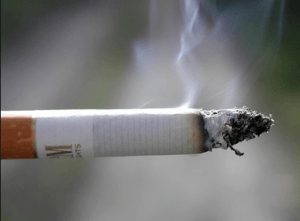About 8 million people worldwide estimated to die yearly from smoking by 2030
 Worldwide, eight million people are estimated to die yearly by 2030 with more than 80 per cent coming from low-and-middle income countries like Ghana. Averagely, nations lose more than 1.5 trillion in healthcare, loss of labour and cleaning up tobacco litter in neighbourhoods.
Worldwide, eight million people are estimated to die yearly by 2030 with more than 80 per cent coming from low-and-middle income countries like Ghana. Averagely, nations lose more than 1.5 trillion in healthcare, loss of labour and cleaning up tobacco litter in neighbourhoods.
The Food and Drugs Authority (FDA) has warned the citizenry especially the young population to be wary of illicit use of tobacco products, which is impacting negatively on health, legal and economic, governance and corruption.
“Illicit tobacco products hook young people into its experiment and use because they are more affordable and misleading young tobacco users by not displaying health warnings”.
Mrs Olivia Agyekumwaa Boateng, Head of Tobacco and Substances of Abuse Department of FDA gave the warning in an interview with the Ghana News Agency.
She explained that illicit trade was posing a serious threat not only in high-income countries; but throughout the world.
Citing some of the threats posed by illicit trade, Mrs Boateng mentioned tax revenue, which could have otherwise been spent on the provision of public services was being directed into the “hands of criminals’.
She said illicit trade strengthened corruption and weakened good governance, whilst tobacco companies were using the identified loopholes in tobacco control regulation systems to indulge in the illicit trade of tobacco products.
Illicit tobacco market accounted for one in every 10 cigarettes consumed globally, according to studies, including information supplied by the global customs community. The European Commission estimated that illicit trade in cigarettes cost the EU and their Member States over €10 billion annually in lost tax and customs revenue.
“In response to the threat posed by illicit tobacco trade, the international community negotiated and adopted in November 2012 the Protocol to Eliminate Illicit Trade in Tobacco Products, the first protocol to the World Health Organisation Framework Convention on Tobacco Control (WHO FCTC)”, she added.
The objective of the Protocol, she said, is to eliminate all forms of illicit trade in tobacco products in accordance with the terms of Article 15 of the WHO- FCTC.
Mrs Boateng noted that nearly six million people worldwide were killed by the tobacco epidemic of which more than 600 000 non-smokers have died from breathing second-hand smoke.
Tobacco products are known to contain 7,000 chemicals; hundreds of which are known to be toxic and about 69 are carcinogenic, examples are Benzene, Arsenic, Cadmuim, Carbon monoxide and Formaldehyde.
Worldwide, eight million people are estimated to die yearly by 2030 with more than 80 per cent coming from low-and-middle income countries like Ghana. Averagely, nations lose more than 1.5 trillion in healthcare, loss of labour and cleaning up tobacco litter in neighbourhoods.
She explained that the Ministry of Health in collaboration with FDA and other stakeholders in tobacco control have developed a Legislative Instrument (LI) which has been forwarded to the Attorney Generals’ Department to be placed before Parliament for approval. The passage of the LI, will extensively support FDA to enforce the aspects of the Public Health Act 851, which falls under their jurisdiction.
“The tobacco control provisions in the Public Health Act were introduced due to Ghana’s recognition of the harmful effects of tobacco use and the need to protect her citizens from the harm of tobacco consumption and exposure to tobacco smoke. The enactment of the law is also an obligation of Ghana as a party to the WHO FCTC”.
Mrs Boateng said FDA has put measures in place to eliminate illicit tobacco and these includes: strengthening regulations at the Ports of entry, Registration of tobacco and tobacco products, Registration of tobacco importers, permit authorization systems and monitoring tobacco products on the market through FDA’s Post Market Surveillance Activities.
Others she said included, labelling requirements such as health warnings on packs, which should have the inscription “FOR SALE IN GHANA ONLY” displayed on the side panel of the tobacco product pack, the country of origin stated on the tobacco products pack, 18 years as the lowest age limit for sale of tobacco which is also stated on the products pack.
She called on Ghanaians to guard against the use of tobacco products and said the FDA was partnering with other governmental agencies and organizations to help curb the influx of unregistered products, raise awareness on the harm to people’s health caused by the illicit trade in tobacco products, especially the youth and low-income groups, due to the increased accessibility and affordability.
“A person who contravenes any part of the public health Act 2012, Part six is liable to a fine of not more than 750 penalty units (fine of GH¢9000) or a term of imprisonment of not more than 3 years or both”.
In the case of a continuing offense, a further fine of 10 penalty units applies for each day during which the offense continues and an administrative charge of GH¢25,000 as per fees and charges (Amendment) Instrument, 2013 (LI2206)”, she added.
All citizens of Ghana have the right to life and the right to the highest standards of health therefore insist on a tobacco free environment.
Source: GNA
